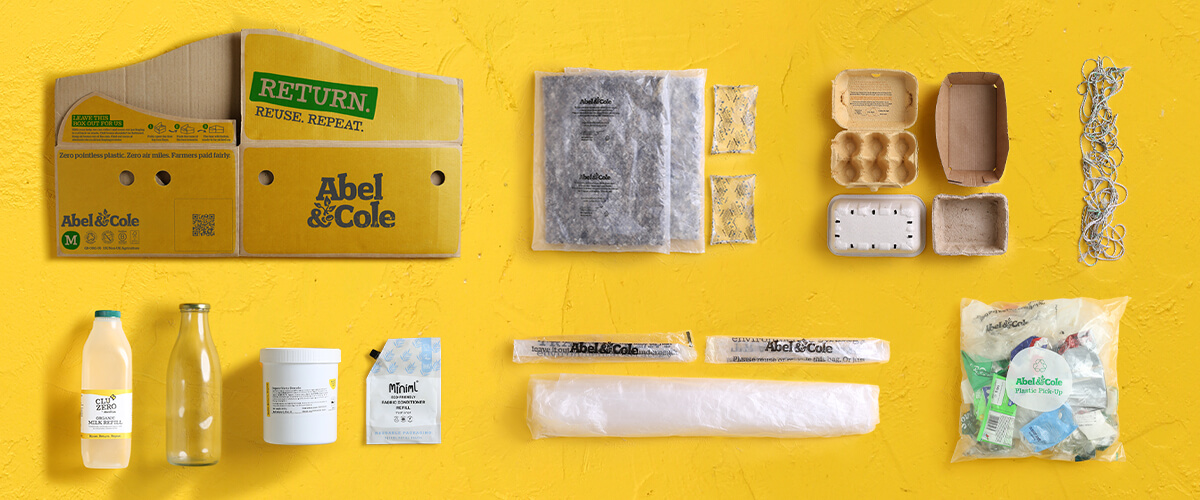ZERO POINTLESS PLASTIC

At Abel & Cole, sustainability is at the heart of everything we do. One area where this is particularly important is our approach to packaging. Packaging plays a crucial role, not only in protecting products but also in reducing food waste and providing essential information to our customers. But navigating the complex relationship between packaging, sustainability and waste reduction requires a holistic approach.
Packaging must have a purpose
The challenge with packaging lies in striking the right balance between the use of hard-to-recycle materials – particularly plastic – which can clog up recycling systems or contribute to litter, and the risk that inappropriate or insufficient packaging can lead to food waste, as products spoil before they can be enjoyed.

Interrogating our use of packaging
We’ve embarked on several packaging reduction exercises over the years, ensuring that every piece of packaging we use has a clear purpose. Whether that’s maintaining quality during transit or protecting fragile produce, we make sure that our packaging is working hard for both our customers and the environment.
Our journey began with the assessment of all packaging in our fruit and vegetables range, ensuring that each item was optimised for protection and quality preservation. Today, most of our packaging is paper based. But there are instances where plastic remains the best option – particularly for leafy greens like lettuce and spinach, or moisture-sensitive produce like cucumbers. In these cases, plastic helps to lock in freshness and prevent food waste, and so has an important purpose.
Despite these selective uses of plastic, we take our responsibility seriously. That’s why we continuously monitor our plastic usage, collaborating annually with Everyday Plastic to measure this in our organic Fruit & Veg Boxes. Their research has shown that we use at least 77% less plastic than four major UK supermarkets on average. This is a huge achievement, but we’re not stopping there.
Innovating sustainable packaging solutions
We’ve long been trailblazers when it comes to innovative packaging solutions. Our iconic cardboard delivery boxes, designed to be reused multiple times, are just one example of our commitment to minimising waste. We’ve also adopted reusable wool insulation from Woolcool® to ensure that perishable products are kept at the right temperature – without resorting to wasteful single-use alternatives like expanded polystyrene (EPS).
In 2020, we launched Club Zero, our refillable product range, which now boasts over 100 products. It offers a refillable solution for household staples, enabling customers to cut back on single-use plastic packaging.
Helping our customers recycle flexi-plastics
Eliminating unnecessary packaging and reducing single-use plastic in our boxes is one thing. But we also want to slim our shoppers’ bins further by providing a sustainable end-of-life solution for any hard-to-recycle flexi-plastics they have at home. Either from our deliveries (because that packaging serves an essential purpose), or from other retailers.
So, in June 2022, we launched Plastic Pick-Up – our groundbreaking doorstep recycling service which collects the hard-to-recycle flexi-plastics that have become ubiquitous in retail, but don’t currently fit into many local council kerbside recycling schemes. Since its launch, we’ve recycled over 50 tonnes of flexi-plastic into useful materials for the construction industry.
Plastic is ultimately a material resource, and simply removing it has the unintended effect of creating new problems depending on the end use – whether that be an increase in food waste or carbon emissions. That said, it’s vital that businesses interrogate each piece of packaging to ensure it’s fulfilling the brief of protecting products and reducing wastage. If not, it should be removed or replaced.
Published September 2024


